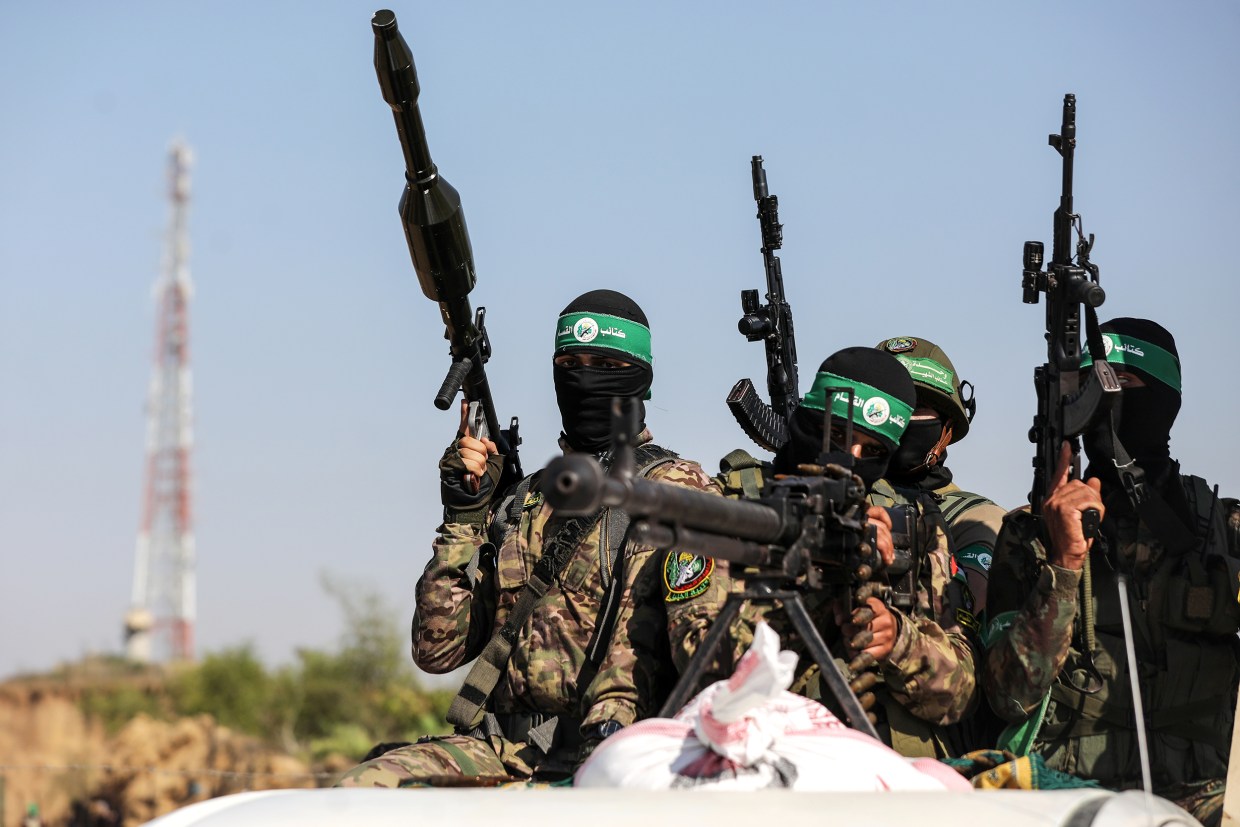U.S. investigating whether Iran gave advanced training to Hamas militants

According to former and current U.S. officials, American officials are looking into whether some Hamas militants involved in the attack on Israel were trained by Iran’s Islamic Revolutionary Guard Corps.
The investigators are also looking into whether Hamas has used the recent protests in Gaza as a cover to plant explosives which were then used to breach Israel’s barrier. If confirmed, the advanced training and explosives placement would be just the latest in a long line of Iranian support for Hamas.
Former and current U.S. officials claim that the attack, which was much more sophisticated than previous Hamas attacks, would not have happened without the funding and weapons Iran provided to the militant group.
Matthew Levitt is a former senior official at the Treasury and State Departments who specialized in counterterrorism.
|
Jake Sullivan said that Iran was “complicit in” the attack which resulted in more than 1,000 Israelis being killed. Estimated 150 Israelis, as well as an unknown number U.S. residents were taken hostage.
Sullivan stated, “We have said from the beginning that Iran has been complicit in a wide sense, because they provided the lion’s share of funding for the Hamas military wing, they provided training, capabilities, and they provided support.” “They’ve been in contact and had long-term engagement with Hamas, and that all played a part in what we saw.”
Sullivan said that at this time, the U.S. cannot confirm whether Iran was aware of the attack or participated in its planning or execution.
Levitt expressed his skepticism that Iran would be directly implicated in the attack. He said Iranian officials seldom give their agents explicit instructions to carry out specific operations. He said that this is not the way things are done.
Former officials and analysts claim that Iran sends around $100 million per year to Hamas. It has also provided the technology and know-how to enable Hamas’s arsenal of rockets to be built in Gaza using Iranian designs.
Hamas launched 4,000 rockets in its 11-day conflict with Israel that lasted from 2021 to 2022. It fired 2,500 missiles on Saturday, indicating that it has a larger arsenal.
The New York Times reported that Hamas used drones for other purposes, including to disable military surveillance towers and damage cell transmission stations. This prevented soldiers from monitoring the border. The drones also disabled remote controlled machine guns, which were key in stopping a ground assault.
Hamas was focusing on swarming several entry points along Israel’s border. They posted videos while waving flags and held territory as long as they could. They also killed and abducted Israelis without discrimination to “punish Israel’s deterrence, security, and negotiate over hostages, and then draw them into a war on their turf.” Levitt explained.
Iranian officials have been bragging about their role in arming Hamas, a militia and political party backed by Iran, in Gaza, and Hezbollah in Lebanon for years.
Amir Ali Hajizadeh said in an interview with the Islamic Revolutionary Guard Corps Aerospace Force commander Gen. Amir Ali Hajizadeh that Gaza and Lebanon are at the forefront of Israel’s battle and that “everything that you see of their rocket capability was supported by the Islamic Republic of Iran.”
He said that instead of teaching our friends and allies how to catch fish, they were taught to make a fishing hook. They now have missile technologies and capabilities.
The relationship between Iran and Hamas goes back to the early 1990s when the group rose to prominence in Gaza. Iran hosted Hamas leaders in conferences in Tehran to promote a more hardline alternative to Fatah – the Palestinian party that was involved in Arab-Israeli talks at the time. Iranian officials invited Hamas fighters to training camps for Tehran’s regional proxies.
Security experts say that after initially providing Hamas weapons smuggled to Gaza, Iran has helped the group produce its own rockets in-country, using Iranian designs and technologies.
Ido Levy, of the Washington Institute for Near East Policy, stated that members of Hezbollah’s and Iran’s Islamic Revolutionary Guard Corps showed Hamas engineers to make short range rockets using everyday materials like sugar and pipes. Hamas began firing Iranian Fajr-5 long-range rockets in 2012 at Tel Aviv, Jerusalem and Tel Aviv.
Since then, Hamas’s ability to rapidly launch large numbers rockets at targets up to 45 mile distances has improved.
“Much of what Hamas fires on Israel is based upon Iranian technology, but they are not Iranian manufactured per se,” said Kenneth Katzman. He is a senior fellow with the Soufan Center a nonprofit organization that focuses on global security and a former analyst at the Congressional Research Service. “Iran has been transferring technology to Hamas since a long time.”
Hamas’s massive rocket launches have been an attempt to overwhelm Israel’s Iron Dome system of air defense, which is meant to shoot down rockets at low altitude. Levy noted that although Iron Dome is a highly effective system, “some rockets will inevitably make it through.”
Experts say that Iran has been cultivating Hamas, Hezbollah, and other proxy groups in the region for decades to help counter countries with stronger conventional militaries. They also want to make enemies think twice before attacking Iran. They have sometimes taught the same tactics and strategies to different proxies.
Experts say that the Hamas attack on Israel is strikingly similar to the tactics used by the Hezbollah in Lebanon. Levitt stated that it was “straight from the Hezbollah Playbook”.








No Comments